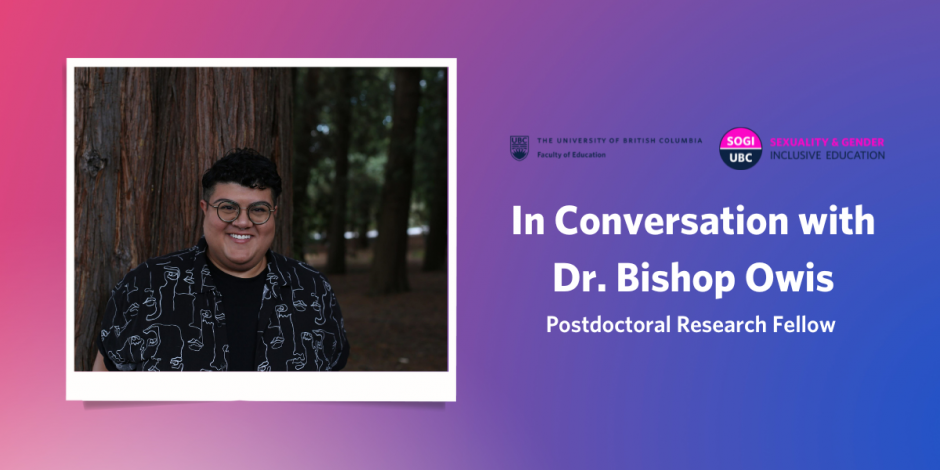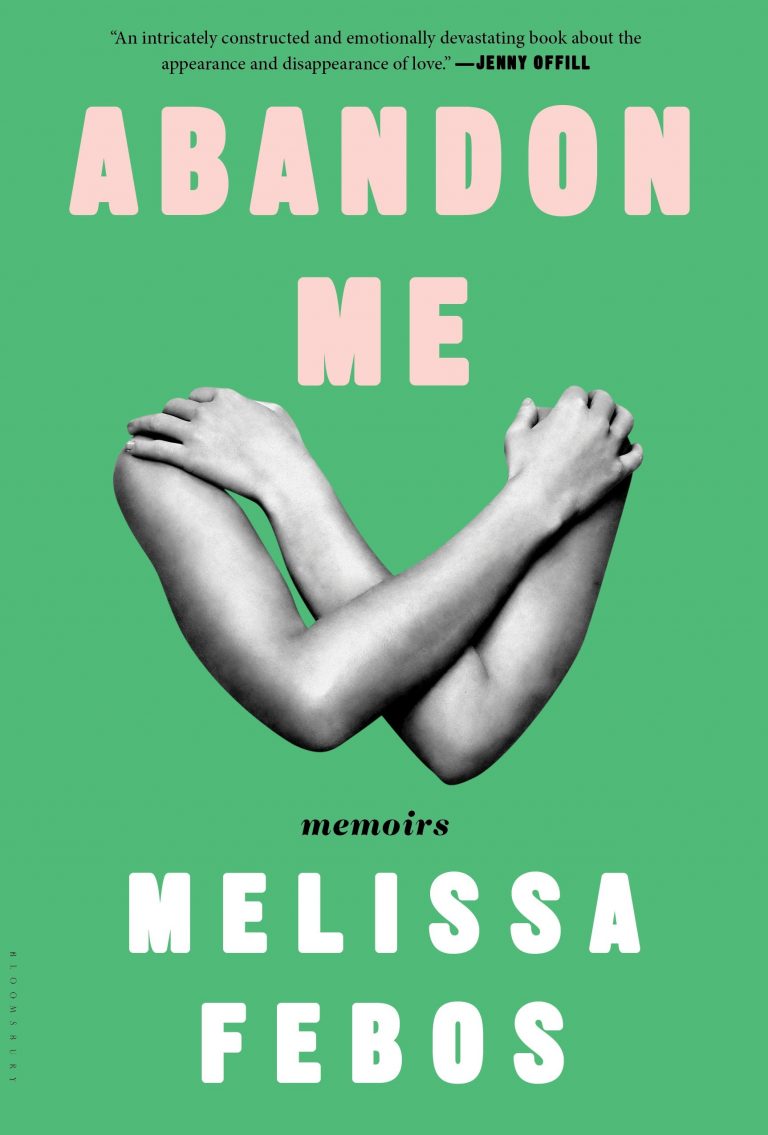
We caught up with SOGI UBC post-doctoral fellow, Dr. Bishop Owis, to talk research, life and advice. Born and raised on the East coast, Dr. Owis journeyed West and joined SOGI UBC earlier this year. They lead the design and development of SOGI UBC’s Summer Institute and are working on a number of research projects related to 2SLGBTQ+ issues in teacher education, including the Trans Workers in Schools Project led by Dr. Harper Keenan, which studies the working conditions facing trans workers in U.S. and Canadian schools. Dr. Owis’ own research is at “the intersections of gender, sexuality, race and colonialism in education using public and art-based pedagogies that centre care to inform a sense of collective imagination; one that strives for queer futurity, world-building and thriving.” Dr. Owis is currently teaching a course in the Gender, Race, Sexuality, and Social Justice (GRSJ) department titled, “Intersectional Approaches to Thinking Gender,” and is also designing and leading the SOGI UBC Summer Institute for practicing teachers. As a multi-talented air sign that plays a few instruments, Dr. Owis almost went to theatre school but their love for art-based education and pedagogies is what led them here! In conversation, we learned about the intention, passion, and care Dr. Owis puts into their research as well as their cheesy character, favourite read, and advice they have for educators and pre-service teachers.
Without further ado…
—
What brings you joy and what inspires you?
I find a lot of joy and inspiration in community. People coming together to work and advocate for some type of common goal. In teaching, asking really important questions help us think more critically about the world. I find a lot of joy in curiosity. I’m a very curious person. Getting to talk to others about ideas and the world we live in is always really inspiring for me. And of course, I’m always really inspired by youth, by caring educators, and by people who continue to refuse to be silenced and erased.
Besides that, I find joy in a lot of really small things: good meals with people I love, being in nature, feeling a sense of awe by how beautiful the land is, when you’re teaching a kid and something clicks in their head and you can see it on their face– that moment, art and art-making in all of its different forms, naps, my cats, a lot of cheesy things. I’m really sentimental.
What are you excited about moving to Vancouver? What are you nervous about?
Excited: access to the outdoors; mountains, beaches, and the ocean, fresh seafood
Nervous: finding community in Vancouver and shift/pace of life; chill west coast vibes versus fast paced east coast vibes
What was the biggest obstacle when challenging whiteness and colonial ways of knowing/learning about gender & sexuality? How did you overcome those obstacles?
The structure of teacher education is incredibly rigid in the neoliberal, capitalist structure of a university, which is a business first and a place of learning second. But the most prevalent obstacle was really how Gender & Sexuality education has been conceptualized in practice which is still very much LGBTQ 101, very focused on inclusion and diversity, and not rocking the boat. Teacher education is historically and is still very much conservative.
There is a lot more work we have to do in terms of reconciling our knowledge of how whiteness and colonialism have operated inside gender and sexuality. In the work that I’ve done, I noticed that within the field of education and gender & sexuality, there is rarely a discussion about race and colonialism. When race is discussed, there is little to no attention paid to colonialism. Colonialism is often the one on its own which is interesting because all these things are inherently linked. They rely on and inform one another and to separate them is to only see 1/8 of the whole picture.
We have to really continue to restitch together these conversations that have been ripped apart from one other by capitalism, neoliberalism, whiteness, and colonialism. Those structures really have the ability to silo things and separate them. I see it as part of my job to reconnect those areas by continuing to do research and teaching that puts them back in conversation with one another.
What are you most proud of in your journey as a student to educator?
Real talk, it’s definitely my mental health and how I’ve been able to navigate it as a student and now an educator. We really don’t live in a society where care for each other or for ourselves is valued. When it is, it is packaged and resold to us in a very commodified way as if we should be grateful for care, rest, mindfulness and mental wellness.
I’ve always struggled with mental illness and learning how to be kind and gentle with myself while also seeking help as well as taking the time that I deserve and need in order to care for myself has been the biggest learning growth in the past 10 years. I could barely attend class in undergrad because I was so sick and unwell, so to be on the other side of that knowing what I know is really a gift in a lot of ways. It’s always a work in progress, it’s made me a better educator and a better person. I teach my classes and do research with the understanding that life is incredibly difficult for a lot of us and that we can all use a lot more care and support. That was not something I learned in my process of becoming a teacher or even in my process of finishing my degrees. It was really something that I learned through my own personal challenges.
Can you elaborate on the importance of care and understanding the needs of the community (as opposed to the harmful power dynamic of telling queer, trans, and gender-diverse youth of colour what they need)?
I think care is one of, if not, the most important values we can center in education but also just generally in life. We need care and we need relational care. COVID has really shown us that time and time again that we need each other in ways that we have really yet to fully grapple with. We’re social people by nature and we need love and care from one another. A lot of the systems we interact with every day, in this case we’re talking about the educational system, is not set up to provide care for students who are not white, cis-gender, and straight. We know this because that is who the educational system was made for. On top of that, it has been and continues to be a site of indoctrination, genocide, and violence for many Indigenous and racialized folks. Care is incredibly important when we’re thinking about education. To be able to care in ways that are affirming and ways that are disruptive to whiteness and colonialism, in ways that are holistic, vulnerable, and healing means that we can actually engage in the social justice work that we want to do.
I’ve always said that it’s difficult to change something that you don’t care about. We hear stories of children or adults saying “I was really transphobic” or “I really didn’t understand non-binary people…then my brother/sister/aunt etc came out and it changed my mind.” Those stories are lovely but it’s interesting that because we know and care about these people our relationship to them and our care to them is what helps us move through that unlearning. So, what happens when we don’t know someone? Or when it’s an abstract idea of a person or community who has no relationship to you and your life. It’s difficult to apply that same type of logic and so we have to actively learn how to care about people different than us in order to advocate for them and with them and demand different forms of justice.
So when I say I’m researching care, I’m researching how we can learn to care across lines of difference. It comes down to something as basic as learning how to care when someone’s well-being and thrival doesn’t benefit you at all.
If you could read one book over and over for the rest of your life, what would it be?

What are three pieces of advice that you have for educators and pre-service teachers in supporting queer, trans, and gender-diverse youth of colour?
Lifelong advice: There needs to be some type of critical interrogation of yourself. Where you come from, the biases you hold, the privileges that you have.
Difficult advice: Learning to be comfortable with uncertainty and not knowing. Be humble about it, educate yourself, lean on support systems that you might have in place, look for help (there is always someone who wants to help, someone who is willing to talk, someone who is willing to share resources).
To practice deep listening, when you’re learning and unlearning, being able to not respond or judge, being able to sit with that information, decentering yourself and your emotions in the process of learning because likely what you’re going to be learning is very difficult and unsettling and probably incompatible with a lot of the realities that you have experienced. Just being able to hold space for your own experiences that’s true for you while understanding that they’re not universal truths. To get there, you have to learn how to listen without needing to respond or relate it back to yourself.
None of this advice is easy and I recognize that. It’s still stuff I’m working on as well. But being a teacher or an educator, and caring for the well-being of children is not easy. It just isn’t. It’s ongoing difficult work that can make us better educators but also just better friends, partners, colleagues, and better humans. I think education really forced us to see the cracks and deficits of our societies on every level; social, political and economic, and despite its violent history and its harmful ongoing presence, I feel like education can be a source of justice and thrival.